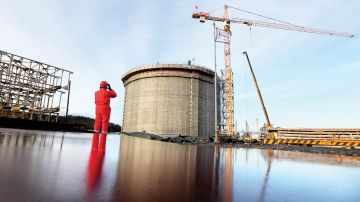INEOS is now one of the biggest companies in the UK’s shale gas industry.
But it knows it is easy to be the biggest.
It’s quite another to be the best and the most trusted.
With trust in big business, banks and politicians now at an all-time low, it has never been more important to win back the respect of the people.
In April last year INEOS Shale, which now has government licences to explore one million acres in the UK for shale gas, began its quest to show communities that its intentions are honourable.
“We are in this for the long-term,” said CEO Gary Haywood. “It’s not just about making money. We want to help lead a manufacturing renaissance in Britain and we believe an indigenous shale gas industry can do that.”
It has already begun talking to communities in Scotland where it has licences to explore thousands of acres close to its manufacturing plant in Grangemouth.
But as it waits for Scotland to lift its current ban on fracking, pending further inquiries, INEOS Shale has moved south – into England – where it hopes to convince people in Cheshire, Yorkshire, Derbyshire and the East Midlands of the benefits that a domestic shale gas industry could bring.
“We understand that people in these areas are concerned,” said Gary. “And that is partly because there are so many myths about shale gas extraction. But we want to show that this can be done well and safely, and we want to meet the people in areas where we hold licences.”
Exhibitions are being arranged to allow local people the opportunity to talk directly to INEOS – and ask any questions – about what it plans to do near their homes.
INEOS Shale has also produced a series of films to dispel fears that people may have. They will be screened at the exhibitions where experts will explain what it means for communities which have been promised 6% of shale gas revenues by INEOS to improve local facilities.
As INCH went to press, INEOS was planning thorough 2D and 3D studies of the rock in each county to check whether gas is present and accessible. If the results from that look promising, permission will be sought to drill 600ft vertical wells to take three-inch wide core samples of the rock to access the quality and quantity of oil and gas in the shale.
“It is effectively like coring an apple,” said Tom Pickering, Operations Director INEOS Upstream. “It’s a cautious approach, led by science, but it is important that we get it right.”
Once INEOS has all the detailed data it needs, a decision will be made whether it is economically sound – and safe – to frack the well using 98% water, 1.5% sand and 0.5% additives, which will prevent the build-up of scale and sterilise the well.
“Some people say that 600 poisonous chemicals are used in fracking but that is just not true,” said Tom. “Most wells require between six and 12 chemicals. All chemicals used will have to be described openly in planning applications and permits.”
INEOS Shale knows that its decision to pursue shale gas exploration has set it on a collision course with environmentalists who claim fracking is dangerous, causes earthquakes, poisons drinking water and affects the air we breathe.
But the company has never been one to run from a challenging situation especially when it believes there is a strong economic and environmental case.
“A home-grown thriving shale gas industry will not only revolutionise manufacturing in Britain, but it will give the UK energy security for the first time in many years and create thousands of jobs in areas which have been hit hardest,” said Gary. “If we can do that and reassure people that the industry can operate without long-term damage to the environment or their way of life, it’s a win-win situation for all.”
Professor Peter Styles, one of three experts commissioned by the UK Government in 2011 to write an independent report after fracking by another company caused minor tremors in Lancashire, believes Britain’s long-term future depends on the vast reserves of shale gas buried deep beneath the ground.
“I don’t think people realise how extremely vulnerable we are in the UK,” he said. “At the moment about 80% of UK domestic heating and cooking is gas and we import half of it. Some of it comes from Norway, which is probably all right, but a lot of it comes from Siberia which has not been the most secure form of supply over the years.”
In January 2009, a dispute between Ukraine and Russia over natural gas prices led to deliveries to a number of European countries being cut off entirely.
“We were down to two days’ supply,” he said. “And when that happens, companies like INEOS ChlorVinyls in Runcorn, which is the third biggest user of gas in Britain, get switched off to protect the domestic supplies.”
INEOS not only uses gas, though, to heat and power its manufacturing plants. Gas is also a vital raw material used to make thousands of essential products that we all rely on each day. Without it, there would be no plastic, medicines, buildings, cars, computers, clothes, or iPad screens.
“That’s often forgotten when we see heated debates about the merits of continuing to use fossil fuels,” said Greet Van Eetvelde, INEOS Manager of Cleantech Initiatives. “Many renewables, such as the important components in wind turbines and solar panels, cannot be made without gas. We will still need gas to make things even when we have switched to a low-carbon energy.”
INEOS Shale, which holds more licences than any other company in the UK, believes most people are open-minded about shale gas development.
“That is all we want,” said Tom. “We are not complacent. We do understand people’s concerns but many of the things people may have read about shale gas simply aren’t true. We are happy to be challenged if people think we are wrong. Understandably, they just want more information. And that is what we hope to provide at these meetings.”
It will be an uphill battle because the anti-fracking groups have hijacked social media.
But INEOS hopes to show that he who shouts the loudest, isn’t necessarily the most knowledgeable.
WHY INEOS IS THE RIGHT COMPANY TO EXTRACT SHALE GAS IN THE UK
FEW companies come with as much expertise as INEOS.
In addition to its expertise above ground, handling flammable gases across its 65 manufacturing sites all over the world, the company also has expertise below ground.
In November, INEOS acquired gas platforms in the North Sea – and, with them, a team of drilling experts who already supply enough gas to heat one in 10 homes in the UK.
INEOS also employs the team who pioneered the development of shale gas in the US with more than 20 years of industry experience.
Chairman Jim Ratcliffe said he could not understand why it was still so hard to convince people that shale gas extraction was safe.
“There is such a wealth of experience of drilling and fracking for shale in North America that it should have dispelled all the concerns and ghosts,” he said. “In America they have now drilled and fracked in excess of one million wells over the past 10 years and it has produced an immense amount of hydrocarbons.”
MISTAKES were made in the early days of shale gas exploration in America.
Faulty well construction led to water contamination and waste water from fracked oil wells was left in open, unlined pits.
“We have studied all of these cases to ensure we do things differently,” said Tom Pickering, Chief Operating Officer of INEOS Shale.
Some US companies had used only one layer of steel in the well.
INEOS will be using up to four layers of steel cemented one inside the other.
Other companies had reused old wells. INEOS will use only new wells.
The waste water was left in open ponds.
INEOS’ waste water will be enclosed in double skinned storage tanks before being recycled.
“It is important to acknowledge that there have been some issues but they happened in the early days of shale gas exploration in America and we don’t live in America,” said Tom. “This is the UK where we have one of the most rigorous regulatory regimes in the world.”
Having reviewed the available evidence, the Royal Society and Royal Academy of Engineering have concluded that shale gas can be extracted safely with appropriate regulation. Extracting shale gas is not risk free and has to be done carefully, but the risks are manageable and comparable to other practices.
















